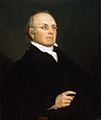Taxing and Spending Clause facts for kids
The Taxing and Spending Clause is a very important part of the U.S. Constitution. You can find it in Article I, Section 8, Clause 1. This clause gives the federal government the power to collect taxes.
Why does the government collect taxes? For two main reasons:
- To pay the country's debts.
- To provide for the common defense (like the military) and the general welfare of the United States. This means helping all citizens.
Inside the Taxing and Spending Clause, there are two other important parts: the General Welfare Clause and the Uniformity Clause.
Contents
What the Clause Says
The Congress shall have Power To lay and collect Taxes, Duties, Imposts (form of tax) and Excises, to pay the Debts and provide for the common Defence and general Welfare of the United States; but all Duties, Imposts and Excises shall be uniform throughout the United States;
This quote means that Congress can collect different kinds of taxes, like duties (taxes on imported goods), imposts (another word for taxes), and excises (taxes on certain goods or services). The money collected is used to pay debts and help the country. The last part, "uniform throughout the United States," means these taxes must be the same everywhere in the country.
Why This Clause Was Added
Before the Constitution, the United States was governed by something called the Articles of Confederation. This was from 1781 to 1789. Under these Articles, the central government could not collect taxes. Only the individual states had that power.
The central government could only ask states for money. It could also borrow money or sell land. This system was designed to keep the central government weak. Most of the power stayed with the states.
However, this caused big problems. The government had no money to pay its debts. It also couldn't enforce its laws or treaties. This was a major issue that leaders discussed at the Constitutional Convention in 1787. They decided to change this in the new Constitution. Giving Congress the power to tax was a big step to make the federal government stronger and more effective.
Types of Taxes and Rules
The Constitution gives Congress the power to collect taxes. However, there are some important rules and limits:
- Congress cannot tax any goods that are exported from any state. This means products made in one state and sold to another country cannot be taxed by the federal government when they leave the state.
- There are also rules for "direct taxes." These taxes must follow a rule called apportionment. This means they have to be divided among the states based on their population.
The General Welfare Clause
The Constitution says Congress has the power to "provide . . . for the general welfare." This means they can collect taxes to help everyone in the country.
In 1791, Thomas Jefferson wrote about this. He said that Congress collects taxes to help the country as a whole. He believed that the power to tax was for specific purposes: to pay debts or to help the entire country. He argued that Congress couldn't just tax for any reason it wanted. It had to be for the "general welfare" of the Union.
There were different ideas about what "the general welfare" truly meant.
- Alexander Hamilton thought it meant exactly what it said: for the benefit of every citizen.
- James Madison had a more limited view. He believed the clause only allowed Congress to tax to support itself and keep the government running.
From the very beginning, Congress has mostly followed Hamilton's view. They have increased spending for the general welfare. Often, states also have to contribute money for these programs.
The Uniformity Clause
This clause deals with "indirect taxes." These are taxes that are not directly paid by a person to the government, but are collected by someone else (like a business) and then sent to the government. The Uniformity Clause states that "all Duties, Imposts and Excises shall be uniform throughout the United States."
The Supreme Court has explained what "uniform" means.
- First, a tax is uniform if it works the same way everywhere. It doesn't matter where the thing being taxed is found.
- Second, if a tax is based on a specific geographic area, the Court looks closely to make sure there is no unfair treatment between different places. For example, a tax on oil from one state but not another would likely be seen as unfair.
Images for kids
 | James B. Knighten |
 | Azellia White |
 | Willa Brown |


